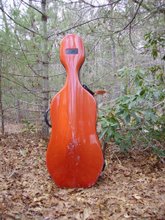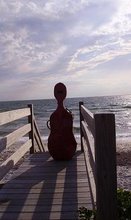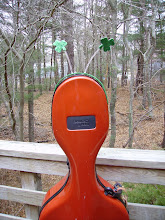I have signed up for summer cello camp: The Boston Harbor Scottish Fiddle School, in August. Abby Newton, one of my favorite cellists, will be teaching. I love her book/CD, Crossing to Scotland, and am working on several pieces in it (Wagonwheel Notch, Crossing to Ireland are my current favorites). I highly recommend it.
I picked this camp because of Abby Newton, and because it is close to home, though still in a remote location (Thompson Island, in Boston Harbor) , and the accommodations look good (single or double rooms, in a dormitory structure). I have camped out before, at Maine Fiddle Camp, but think I want the comfort of an actual bed this time. My only concern is that many of the people in the photos on the Camp's web site look so tired or bored. Maybe it is just incredibly hot.
The camp is sponsored by the Folk Arts Center of New England. Their web site is at http://scottishfiddle.org/bh/index.html.
This will be my fourth summer music camp. I have also attended Summerkeys, Maine Fiddle Camp, and Meadowlark music camp, all in Maine. I had high expectations for the first camp, Summerkeys, expecting to learn about a month's worth of music in a week, after just a year of study. I worked on just one piece (Happy Farmer), correcting bowings and timing, memorizing, and making it sound just a little more like music. I played it perfectly once, during a lesson, not at the recital. I was also in a coached ensemble, but the less I say about that the better.
I never learn as much as I want to at camp--I take too many instruments and/or too many classes; I always take work with me; I try to do too much. Still, I find the experience to be valuable, and I always learn something that stays with me. This year, I am hoping the focus will be just right, balancing cello learning, playing with others, under the trees, relaxing, and becoming more familiar with Scottish music. We shall see.
Wednesday, January 31, 2007
Playing the cello
If I had known how hard it is to learn to play the cello well, I would never have had the courage to begin. Fortunately, I didn't investigate the issue too thoroughly, and decided to jump right in.
After 7+ years of playing, I am now finishing up Suzuki book 3. I've been in book 3 for over 4 years. Kind of hard to believe, as I know there are many people in their 3rd year of study who are in book 4, 5, or 6. I take lessons with an excellent teacher who follows the Suzuki method closely. I memorize all the pieces, every fingering, every bowing; I have a book recital at the end of each book, in which I play all the pieces with a pianist, from memory. I was having a lot of trouble holding all of book 3 in my head at the same time, so, in December I had a "Half-Book 3" recital, and in a couple of months, I will have another recital for the second half of Book 3. I play with numerous other people in small ensembles and involve them in the recitals. My first book 3 recital included five Suzuki pieces and about a dozen ensemble pieces with others singing and playing cello, flute, violin, fiddle, banjo, piano, harpsichord, Irish drum, and guitar. I do enjoy this part of my recitals, but it does, of course, increase the preparation time.
So, while I am proceeding incredibly slowly through the Suzuki system, I work hard at polishing it, and I play a lot of other music. But I often feel I should be better than I am, for playing seven years. I used to practice 2 hours a day, but for a long time have had difficulty finding enough time to practice (in part because I have rehearsals four nights a week, sometimes more, so it is not that I am not playing at all). I love playing, I love the ensembles, but I know there is no substitute for regular, organized, disciplined practicing. (I also play other instruments, work more than full-time, have a family, and all the usual time-consuming obligations.)
I am hoping that writing this blog will encourage me to practice more (though it may just encourage me to write more).
I enjoy playing classical music, early music, fiddle and folk music, and want to try more improvisation. Maybe even jazz. My goals at the moment:
1. Always, to improve intonation
2. To feel more comfortable in the upper positions and tenor clef
3. To work on fiddle accompaniment and improvisation techniques
4. Generally, to feel more fluid and lyrical, more expressive and confident, to play the way the woman in the red dress looks.
Once, at a symphony concert, the cellist soloist came out on stage, looking gorgeous in her red dress. My young daughter turned to me and said, seriously, "Someday, mom, that will be you." Perhaps not, but it is good to have something to aim for.
After 7+ years of playing, I am now finishing up Suzuki book 3. I've been in book 3 for over 4 years. Kind of hard to believe, as I know there are many people in their 3rd year of study who are in book 4, 5, or 6. I take lessons with an excellent teacher who follows the Suzuki method closely. I memorize all the pieces, every fingering, every bowing; I have a book recital at the end of each book, in which I play all the pieces with a pianist, from memory. I was having a lot of trouble holding all of book 3 in my head at the same time, so, in December I had a "Half-Book 3" recital, and in a couple of months, I will have another recital for the second half of Book 3. I play with numerous other people in small ensembles and involve them in the recitals. My first book 3 recital included five Suzuki pieces and about a dozen ensemble pieces with others singing and playing cello, flute, violin, fiddle, banjo, piano, harpsichord, Irish drum, and guitar. I do enjoy this part of my recitals, but it does, of course, increase the preparation time.
So, while I am proceeding incredibly slowly through the Suzuki system, I work hard at polishing it, and I play a lot of other music. But I often feel I should be better than I am, for playing seven years. I used to practice 2 hours a day, but for a long time have had difficulty finding enough time to practice (in part because I have rehearsals four nights a week, sometimes more, so it is not that I am not playing at all). I love playing, I love the ensembles, but I know there is no substitute for regular, organized, disciplined practicing. (I also play other instruments, work more than full-time, have a family, and all the usual time-consuming obligations.)
I am hoping that writing this blog will encourage me to practice more (though it may just encourage me to write more).
I enjoy playing classical music, early music, fiddle and folk music, and want to try more improvisation. Maybe even jazz. My goals at the moment:
1. Always, to improve intonation
2. To feel more comfortable in the upper positions and tenor clef
3. To work on fiddle accompaniment and improvisation techniques
4. Generally, to feel more fluid and lyrical, more expressive and confident, to play the way the woman in the red dress looks.
Once, at a symphony concert, the cellist soloist came out on stage, looking gorgeous in her red dress. My young daughter turned to me and said, seriously, "Someday, mom, that will be you." Perhaps not, but it is good to have something to aim for.
Tuesday, January 30, 2007
Denise Djokic
I have been asked to write a review of a local concert featuring cellist Denise Djokic. I am not familiar with her, but various web sites call her the "best young cellist in the world," with a "warm and lyrical" sound. "Lyrical" is my favorite word to use in music reviews. The "All Things Considered" reviewer said, "she shows how classical music can let its hair down without dying it purple." I love this and may quote it in my review if it seems appropriate.
I am excited to discover that she has a CD called Folk Lore, which features classical music with folk themes. I have ordered her CD and am looking forward to this concert. My usual nervousness about reviewing a concert has dimished considerably.
I am excited to discover that she has a CD called Folk Lore, which features classical music with folk themes. I have ordered her CD and am looking forward to this concert. My usual nervousness about reviewing a concert has dimished considerably.
Labels:
cello,
classical music,
Denise Djokic,
folk music,
music reviews
Monday, January 29, 2007
Improvisational cello fiddling
I have been trying to learn to play fiddle music on the cello by learning tunes on the fiddle, writing them down, transposing them to cello, and then learning them on cello. A very convoluted route, and I don't play either instrument fast or accurately enough to keep up with others in fiddle sessions, except on very easy or slow tunes. Sometimes I tried to work out accompaiment based on guitar chords, but I am not really good at this in the midst of a session. I need to find the time to practice this and to find a fiddler who is willing to work with me, slowly, on this.
Last session, I decided on another route: not trying to play the melody, but improvising a cello baseline, not worrying so much about the chords, but trying to find notes that fit. Sometimes I played little snippets of the tune; sometimes I played long notes; sometimes I tried some pizz. or rhythmic variations. I played an improvisational solo for one tune that I did not know. It felt good.
I am lucky that the fiddlers I play with are so supportive. They like the the cello and think it adds something to the music. It is certainly better than my fiddle playing!
Last session, I decided on another route: not trying to play the melody, but improvising a cello baseline, not worrying so much about the chords, but trying to find notes that fit. Sometimes I played little snippets of the tune; sometimes I played long notes; sometimes I tried some pizz. or rhythmic variations. I played an improvisational solo for one tune that I did not know. It felt good.
I am lucky that the fiddlers I play with are so supportive. They like the the cello and think it adds something to the music. It is certainly better than my fiddle playing!
Sunday, January 28, 2007
January 27 March on Washington
Appalled by Bush's plan to send 20,000 more troops to Iraq, I joined the antiwar protest in Washington DC this weekend. I liked the purpose of it--to ask Congress to represent the people who elected them, stand up to "the decider," and support the troops by bringing them home.
At 10 pm Friday night, my daughter and I boarded a bus sponsored by Cape Codders United for Peace and Justice; we arrived in Washington about 8 am. Our first stop was for a delicious buffet breakfast, generously provided by the Friends at the Quaker meeting house on Florida Ave., just around the corner from where my husband and I lived when we were first married.
I went to college in Washington DC, back in the 1960s, during the Vietnam war era, and my husband and I lived there for another four years, so I am not a stranger to anti-war protests, but I had not been to one in years.
After breakfast, my daughter and I walked down to the mall, a distance of maybe 3 miles. The streets seemed very quiet, though occasionally we would see another group of people from our bus. We walked by the White House. Only one demonstrator, a regular, was out front. There were other people about, but they were waiting in line for White House tours.
We got to the mall at about 11 am, just as the speeches were starting. We passed people selling buttons and giving away literature and signs. We picked a couple: "I voted for Peace" and "Impeach Cheney first and then Bush." We passed a large group of jovial people from Melbourne, FL, taking photos of themselves in front of their banner. Suddenly emotional, I started crying, in part because so many people had come from long distances, and in part because, I was afraid that there would not be enough people to really make a difference in U.S. foreign policy. I am not sure how many people came; the media said 100,000; the organizers, United for Peace and Justice, claim 500,000 (the size of the largests anti-Vietnam protests).
In many ways, this protest was a lot like the protests of the 60s. People felt fervently about the issues; signs and banners colorfully addressed the issues; celebrities and peace and justice leaders spoke; enthusiasm and solidarity were high.
But there were differences too. The 60s demonstrations were driven by college students and other young people. All age groups and types of people were represented at yesterday's protest, but gray-haired former protesters predominated. The current absence of a military draft might be a factor.
In the 60s, the demonstrations were against the president's policies, the congress, the military-industrial complex, chemical and other corporations, and--anyone over 30. The January 27 protest was directed against Bush and Cheney, and implied a faith that Congress would in fact act against the war. There were many, many organizations: veterans for peace, women for peace, Gold Star families for peace, people serving in the military for peace, kids for peace, socialists, unions, religious groups, nuclear disarmament groups, people concerned about global warming, people wanting Guantanamo closed, gay/bisexual/transgender groups, people wanting to end Israeli occupation of Palestine, local and national peace organizations, and more.
My daughter and I carried white roses, symbolizing "I will not be silent," a reference to resistance to Hitler's attempt to eradicate Jews and other "undesirables."
After the speeches, mostly compelling and energizing, we began the slow march around the Capitol building. I was worried about getting back to the Friends meeting house in time to catch the bus home, so after a time, we stepped out of the march and joined others sitting around the Capitol building reflecting pool. At this point I took out my flute (the cello would have been a bit unwieldy) and played a little. Just something I had to do.
We returned to the Friends Meeting house for a wonderful dinner of soup, salads, cheeses, breads, nuts, and cookies, and looked forward to boarding the bus home at 6:30 pm. At 6:15, we learned that our bus had broken down, .2 mile away from the meeting house. Lug nuts had become loose, and one of the rear wheels had fallen off or was about to fall off. Grateful that this had happened before we had started out, we settled down in various comfortably furnished rooms, and waited. We talked, we read, we slept, we ate, I worked on a project I had brought with me. The Quakers were great throughout it all, offering blankets, food, comfort, and support. Finally, at 2:45 am, we had a new bus, and we headed for home, arriving back on the Cape at noon.
Exhausted and aching from the walking and sitting on a bus so long, we we happy that we went. I hope we made a difference. I know there is much more to do.
Thursday, January 25, 2007
Getting Started
I started the cello over 7 years ago as an adult. At the time, I was playing flute in an amateur adult flute choir, and my flute teacher, a violin teacher and a cello teacher brought their adult students together for an evening of music. Before that evening, I had not given a thought to the cello, but I realized that the rich tones of the cello made the high sqeaky flutes sound so much better. One of the cellists told me she had only been playing a year, and she sounded pretty good to me. I thought I might start the cello myself, to make the flute choir sound better.
About the same time, my family and I went to visit my sister and her three children. Two played violin, one played cello. My daughter, then about 10 years old, decided she wanted to play the cello, just like her cousin. So, my daughter and I started cello together. She no longer plays, but I am grateful for her early enthusiasm. I may not have had the courage to start a new instrument "all by myself."
I still play the flute, and I have since taken up fiddle and toy with mountain dulcimer, guitar, and piano, but the cello seems to define me.
About the same time, my family and I went to visit my sister and her three children. Two played violin, one played cello. My daughter, then about 10 years old, decided she wanted to play the cello, just like her cousin. So, my daughter and I started cello together. She no longer plays, but I am grateful for her early enthusiasm. I may not have had the courage to start a new instrument "all by myself."
I still play the flute, and I have since taken up fiddle and toy with mountain dulcimer, guitar, and piano, but the cello seems to define me.
Subscribe to:
Posts (Atom)












